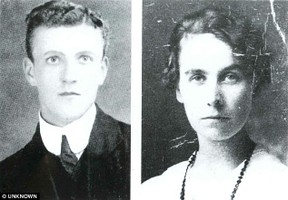 Jock's father didn't like Mary Costin. His step-mother called her a 'slut' on the doorstep. But then Andrew and Alice Hume didn't like a lot of people, their own children included.
Jock's father didn't like Mary Costin. His step-mother called her a 'slut' on the doorstep. But then Andrew and Alice Hume didn't like a lot of people, their own children included.
Jock didn't care what his parents thought. He had moved out of their home months before to live with Mary and her mother.
In Scottish law and tradition, this was a hand-fasting. It meant that any children forthcoming during the next year should be considered legitimate, as long as the couple then married.
His voyage on Titanic would have earned him enough to pay for the wedding ceremony. It was planned for when he returned home from the Atlantic crossing. It would have happened anyway, but the news of the baby hurried things up. Both Mary and Jock were ecstatic at the idea of starting a family.
He must have been thinking of her, as he battled to stay alive in the freezing ocean. She wasn't even listed as his next of kin.
Unmarried and pregnant, in Edwardian Scotland, Mary had an up-hill struggle on her hands. It would take several court cases to even entitle her daughter to assistance from the Titanic Charity Fund. She did the absolute best that she could in the circumstances.
Most stories about Titanic's victims and survivors concentrate on the rich and titled. This biography is something different. It tells, in well-researched depth, the experiences of two working class families in the aftermath of the disaster.
Some of the details are absolutely shocking. For example, I already knew that the crew were all fired from their jobs at the instant that Titanic sank. But I hadn't grasped what that meant. The reality was that their wages stopped at that moment too. White Star Line paid their next of kin what was owed until April 15th, 2.20am, and no more.
But that also included stoppages. Jock Hume had been liable for his own uniform, as well as the White Star insignia and buttons. The costs would have been deducted from his pay, before it was given to him. By the time that the ship sank, he hadn't earned enough to cover what he was wearing. His family received an invoice for the out-standing amount.
That is just one of the jaw-dropping details that you will learn when reading And the Band Played On...



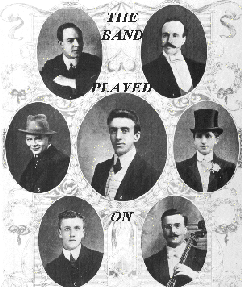 We all know the tale, or do we? As the news about the Titanic sinking starting to permeate through First Class, the band continued to play their music.
We all know the tale, or do we? As the news about the Titanic sinking starting to permeate through First Class, the band continued to play their music.  Jock's father didn't like Mary Costin. His step-mother called her a 'slut' on the doorstep. But then Andrew and Alice Hume didn't like a lot of people, their own children included.
Jock's father didn't like Mary Costin. His step-mother called her a 'slut' on the doorstep. But then Andrew and Alice Hume didn't like a lot of people, their own children included.
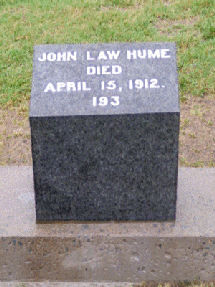 Jock and Mary were the author's grandparents. Christopher Ward's mother was the unborn child, whom Mary was carrying, on the night that the Titanic went down. It's therefore
Jock and Mary were the author's grandparents. Christopher Ward's mother was the unborn child, whom Mary was carrying, on the night that the Titanic went down. It's therefore 




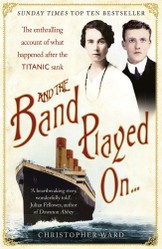

 St Tydecho's Churches in West Waleson 09/03/2014
St Tydecho's Churches in West Waleson 09/03/2014
 Goodies for an Outlander Premiere Partyon 03/06/2015
Goodies for an Outlander Premiere Partyon 03/06/2015
 Holocaust Memorial Day Interview with Rainer Höss, Grandson of Rudolf Architect of Auschwitzon 01/24/2015
Holocaust Memorial Day Interview with Rainer Höss, Grandson of Rudolf Architect of Auschwitzon 01/24/2015
 Romantic Valentine Gifts for an Outlander Fanon 01/16/2015
Romantic Valentine Gifts for an Outlander Fanon 01/16/2015

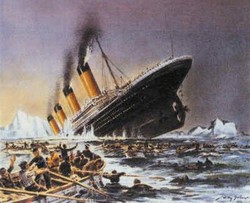
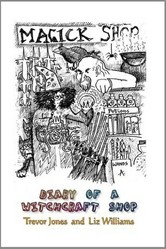
Comments
You're very welcome. They were undoubtedly brave men.
Came back to this article. I find the bit about the band playing on so amazing. Thanks, again, for this article.
I certainly intend to one day.
The violins in Elie Wiesel's film were real too.
If you're interested in that whole story, then there's a book and movie called 'And the Violins Stopped Playing'. It's about the gypsy, Sinti and Roma people killed in the death camps; and how some survived by playing soothing music as others were killed. Such a terrible period in history, and scarily close to happening again.
When its referring to Jews, it's the Holocaust. When it's about the Roma, its the Porajmos. I wrote about it here: http://suite101.com/article/porajmos-...
It's something that I know a bit about, as that's what I did my BA dissertation on.
Right, I think we should do more book reviews here on Wizzley :-). I enjoyed yours very much! That thing about workers being fired, getting an invoice for outstanding debt, and that girl fighting to get her money from the Fund -- amazing. And yes, I remember those violins (I think) playing from when I watched the movie. There are some violins in Elie Wiesel's Night as well. Both scenes, one from the movie, and the other from that book, moved me deeply.
I do recommend it. I was raving about it to everyone I met, then passed the book itself onto my mother.
Awesome review, I've got to get this book now.
I love your husband's idea of assuaging your nerves before he went to sea!
That music in the dark must have been so atmospheric. Did they play 'Nearer My God To Thee'?
My husband is an engineer who spends a lot of time at sea. When we first met this was very worrisome for me. For some reason, one time he took me to see a play about the Titanic the night before he shipped out. The play staging was dreary at best and it was really dragging one. Then the person at the wheel yelled, "Captain we've hit an ice berg." And all of the lights in the theater went out. I thought this is the best part of the staging. Well it was a real power failure. The theater orchestra in an act of theatrical brilliance got up on stage and continued to play in the dark as we left the theater. For some reason that moment has stuck in my brain and I've always had a soft spot for the Titanic band. As always, a great piece of writing, rated up!
Oh cool! Thank you. I'll have to check that out.
Johnny, a friend's publishing company out of Nova Scotia just published one a few years after Titanic sank...Titanic Ashes is the title and it's one I think you'd enjoy. X